

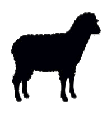
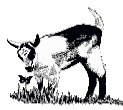













With the passing of one of our beloved AQHA stallions "Preferred Platinum" - own son of "Chicks Beduino", we have decided to discontinue our equine breeding program and concentrate on increasing our livestock herds, particularly Boer Goats, Myotonic Goats and Dorper Sheep. We will maintain our personal riding horses, but will be selling off our breeding horses and give someone else the wonderful opportunity to make their own future, experiences and memories to draw from.
"Platinum" passed at the age of 22 years old, and we were very fortunate and blessed to have owned him for 20 of those years.
"Platinum" passed at the age of 22 years old, and we were very fortunate and blessed to have owned him for 20 of those years.

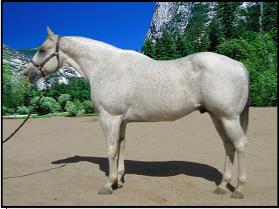
Preferred Platinum
We are focusing our attentions on breeding quality livestock animals. We currently have traditional red-head Boer goats as well as a small herd of Spotted Boer goats.
We also have a herd of purebred and registered Myotonic/Fainting Goats.
We are increasing our Dorper Sheep herd to meet the needs of the public.
We also have a herd of purebred and registered Myotonic/Fainting Goats.
We are increasing our Dorper Sheep herd to meet the needs of the public.

Tidbits of information below about the Boer Goat, the Myotonic Goat and the Dorper Sheep breed...

Boer Goat Breed
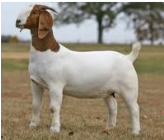
Boer goats are a South African breed that was selected for meat rather than milk production; due to selective breeding and improvement, the Boer goat has a fast growth rate and excellent carcass qualities, making it one of the most popular breeds of meat goat in the world. Boer goats have a high resistance to disease and adapt well to hot, dry semi-deserts.
Boer goats possess long, pendulous ears. They are noted for being docile, fast-growing, and having high fertility rates. Does are reported to have superior mothering skills as compared to other breeds. Boer goats tend to gain weight at about the same rate as their sire, so a buck from a proven fast-growing bloodline will command the highest price, as its offspring will tend to also be fast growers.
Boer goats possess long, pendulous ears. They are noted for being docile, fast-growing, and having high fertility rates. Does are reported to have superior mothering skills as compared to other breeds. Boer goats tend to gain weight at about the same rate as their sire, so a buck from a proven fast-growing bloodline will command the highest price, as its offspring will tend to also be fast growers.


Myotonic Goat Breed (Fainting Goats)
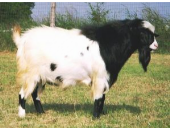

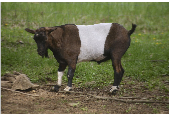
The goats of this breed have a host of names: Myotonic, Tennessee Fainting, Tennessee Meat, Texas Wooden Leg, Stiff, Nervous, and Scare goats. The names refer to the animal's myotonia congenita, a condition in which the muscle cells experience prolonged contraction when the goat is startled. The transitory stiffness associated with these contractions can cause the goat to collapse. This is not a true faint, but a muscular phenomenon unrelated to the nervous system. The degree of stiffness varies from goat to goat, with some showing a consistently stiff response and others exhibiting stiffness only rarely. Myotonic goats are active foragers and are less apt to climb fences and escape from pastures than other goats, and their muscular conformation and high reproductive rate are also highly valued. They are also reasonably parasite resistant.
These goats come in a mariad of colors, horned and polled, brown or blue eyes.
These goats have a heavily muscled conformation, due to the myotonia, which is consistent among these goats, and makes them a good choice as meat producers as these goats have more muscle/weight than other goats. Studies at Virginia State University show that meat to bone ratio is about 4:1 while it is about 3:1 in other breeds. Their meat is considered tender and tasty, ranked at the top of meat quality when compared to meat from other goats. The tenderness appears to be a result of the stiffness exhibited because of their myotonic genetics.
These goats come in a mariad of colors, horned and polled, brown or blue eyes.
These goats have a heavily muscled conformation, due to the myotonia, which is consistent among these goats, and makes them a good choice as meat producers as these goats have more muscle/weight than other goats. Studies at Virginia State University show that meat to bone ratio is about 4:1 while it is about 3:1 in other breeds. Their meat is considered tender and tasty, ranked at the top of meat quality when compared to meat from other goats. The tenderness appears to be a result of the stiffness exhibited because of their myotonic genetics.

Dorper Sheep Breed
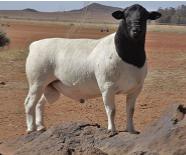
The Dorper is a South African breed developed in the 1930's from the crossing of Dorset Horn and Blackheaded Persian sheep. The breed was developed for the arid extensive regions of South Africa. One of the most fertile of sheep breeds that is hornless with good body length and a short light covering of hair and wool. The breed has the characteristic black head (Dorper) as well as white heads (White Dorper). Furthermore, the breed shows exceptional adaptability, hardiness, reproduction rates and growth (reaching ~80 lbs at 3 1/2 to 4 months of age), as well as good mothering abilities.

Please check out our "FOR SALE" page for any animals we have available for sale.
